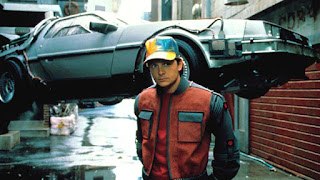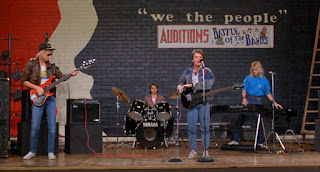It’s October 21, 2015, the day the Doc, Marty, and Jennifer
arrive in the future from 1985, but where are the flying cars?
Back to the Future 2 seemed to promise us all kinds of
interesting technological gadgetry, such as hoverboards, robot trash cans, electronic
dog walkers, etc. On the other hand, the
“real” 2015 doesn’t seem to be coming through with many of these promises. However, as Doc Emmett Brown told Marty and
Jennifer in the third film, “Your future hasn’t been written yet.” These are wise words, and they explain
exactly why we don’t have all of these amazing technological inventions in our
version of 2015.
 |
| Marty McFly in front of a flying DeLorean in the "future." |
Let’s examine the evidence.
In Back to the Future 2, upon returning to 1985, Doc and Marty
discovered that the timeline had skewed on a tangent because of Biff Tannen’s
alteration of events in 1955 (i.e. giving his younger self a copy of Grey’s
Sports Almanac). Furthermore, we know
that certain events that occurred in 1885 had an impact on 1985, such as the
renaming of Clayton Ravine to Eastwood Ravine.
These more salient changes were directly related to actions taken by Doc
and Marty, but what about changes that were more indirectly attributed to their
actions?
This is where things get a bit more precarious. Through travelling forward and backward
through time, Marty is able to learn that his quick temper (particularly when
someone calls him “chicken”) is detrimental to his own goals in life. So when Needles challenges him to a race in
1985, Marty avoids the accident he was destined to have with the Rolls-Royce in
the original timeline, where Marty is badly injured and gives up on his music
career.
 |
| After Clara Clayton is rescued from falling into the ravine, it's name is changed to Eastwood Ravine, since the locomotive that Marty and Doc hijacked plummeted into it. |
Marty was an excellent guitarist, as evidenced by his
audition for the school dance, and in his performance of Johnny B. Goode in
1955. His band, The Pinheads, were on
their way to rock star status, but Marty’s accident with the Rolls-Royce, in
all its consequences, prevented this from ever happening. But, Marty’s future was not yet written. He made a different decision, and avoided the
collision with the Rolls-Royce.
Consequently, The Pinheads took the world by storm and became one of the
best-known rock bands of the 1980s and 1990s.
 |
| The Pinheads unsuccessful audition for the Battle of the Bands (they were too darn loud). |
This is all fine and good, but what about the flying
cars? Well, this is where the “butterfly
effect” comes in, where one life affects another and another until it resonates
throughout the entire world. Only
briefly seen in the first film is the drummer for The Pinheads, Marcus
Daiton. Marcus was a young man with
genius level intelligence, but he lacked self-confidence and motivation,
causing him to be depressed through much of high school. To make matters worse, Principal Strickland
constantly berated him for being a “slacker” and not applying himself more in
school. Because he couldn’t handle the
pressures to succeed, Marcus would retreat to his garage and practice his
drumset for hours on end.
 |
| Principal Strickland explaining to Marty McFly the ways in which he is a slacker. |
In the timeline as it currently exists, Marty avoided the
accident with the Rolls-Royce, and The Pinheads enjoy great success, but the
band has a major falling out in the 1990s when ego drives the lead
singer/guitarist Marty McFly to insist that the band be renamed “Marty McFly
and the Pinheads.” This infuriated the
keyboardist, Cameron Passman, and bass guitarist, Kirby Forsyth. Marcus Daiton did his best to stay out of the
argument, but as he was already struggling with a drug problem, the tense
atmosphere surrounding him led to a relapse and he overdosed on heroin in 1994. The Pinheads tried to keep things going for a
few more years with different drummers, but finally the band dissolved in 1998.
 |
| Needles, challenging Marty to a drag race with his new 4x4. |
In the original timeline, however, Marty injures himself in
the collision with the Rolls-Royce in 1985 and The Pinheads dissolve later
during the same year. They never
achieved fame, and each went their separate ways after high school. The drummer
Marcus Daiton was particularly affected by what happened to Marty. Marcus realized that Marty’s cavalier
rockstar mentality is exactly what led to his accident with the Rolls-Royce and
the subsequent demise of his music career dreams. This prompted Marcus to begin applying
himself in school, where he fell in love with mathematics and science. He became the most improved student during
his junior year in high school, and went on to earn a full scholarship to MIT
in the physics program. However, Marcus’s
anxiety and depression made school difficult for him, and although he achieved
some success in assisting professors with their research projects, he was
unable to complete the program and dropped out during his sophomore year.
 |
| Doc Brown empties the McFly's trash can into Mr. Fusion to refuel his DeLorean. |
Marcus moved back to Hill Valley and got a job as a research
assistant in a small technology company just outside of the city. Surrounded by scientists with PhDs, Marcus
wasn’t quite sure that he fit in at first, but once the other researchers saw
his amazing intellect and creativity, Marcus was able to move up within the
company. Eventually, Marcus began
researching heavily in the field of nuclear physics. In 2007, he made a major breakthrough by creating
a simple device that could take ordinary household trash and consume it to
produce usable energy without generating any pollution. As the only non-PhD Sr. research scientist on the team, Marcus
Daiton was affectionately dubbed “Mr. Fusion,” and his invention would be
branded with the same moniker. The
introduction of Mr. Fusion on the market in 2009 led to a deluge of new inventions
using this new clean power source, including such things as flying cars,
hoverboards, and self-tying shoes.
 |
| Marcus Daiton, Pinheads drummer, Mr. Fusion that was not-to-be |
The unfortunate conclusion to this story is that a
clean-burning “Mr. Fusion” type device still remains somewhere in the
future. Here’s to the Marcus “Mr. Fusion”
Daiton that never was, but long live rock and roll!
No comments:
Post a Comment